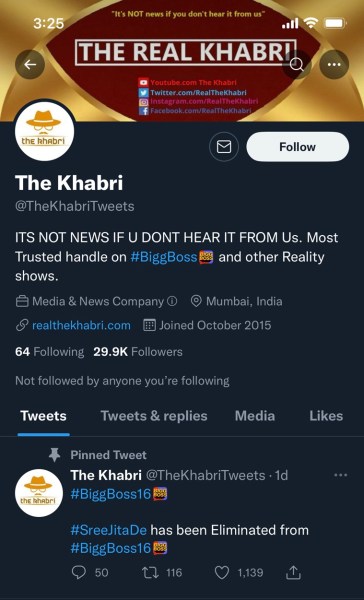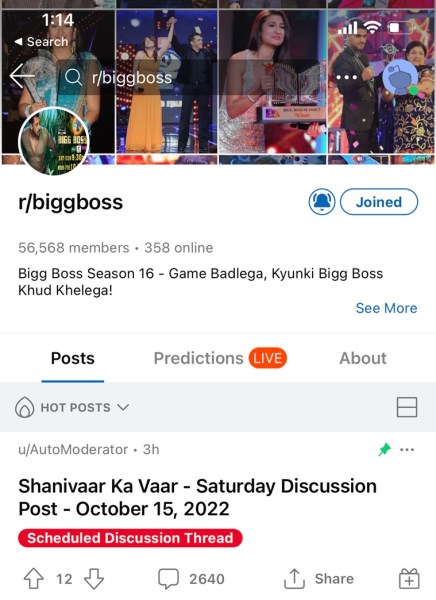Every so often Tsewang watches Bigg Boss on her iPhone, sitting on a chair while her clients get their hair steamed. The beauty consultant uses every 5-minute break to watch a group of people argue, fight and compete on the Colors TV show.
- Advertisement -
She has barely watched anything else since the latest season of Bigg Boss Hindi started airing. Watching that episode, she immediately texted her friends and family on the group chats. Several have commented, people have taken sides, memes have been shared, and when she opened her browser feed, an awful lot of tweets and polls with the hashtag #SajidKhan were trending. The #MeToo accused’s inclusion in the reality show has led to much controversy.
Trapped in a circus themed house, 16 contestants will spend over 3 months, without any phones, internet connection or TV, some fighting, some on their own, all trying to outlive each other in the house and take the Big Boss title home. Fans would be watching their every move, taking sides, participating in choosing the winner and damning those they don’t consider worthy.
Tsewang said she used to watch the show back in her high school days, and turning 26 with a full-time job as a beautician hasn’t changed anything – except for her favourite contestants, and this season, she’s rooting for Tajikistani influencer Abdu Rozik.
- Advertisement -
So, with people avidly following such human drama in the Bigg Boss house, one can ask the question: Is it just voyeurism?
- Advertisement -
Big Boss Khabri AKA Sameer Malik, who has been dedicatedly following the show for many years, finds this comparison unfair. Malik, a native of Mumbai’s Andheri, boasts nearly 30,000 followers on Twitter and has over eight years of experience in running such accounts. For Malik, the show is much more than voyeurism – it is emotional.

- Advertisement -
“They are emotional fans, they get attached to their favourite contestants; supporting them, hyping them up every day and tweeting about them, the connection becomes personal,” he said. “They want to know everything that goes on the show, at times even in contestants’ personal life.”
- Advertisement -
Every Friday, Khabri tweets the latest Bigg Boss elimination names, a day before the official announcement is made on television. “I have some of my guys working at the set so I get the information before TV.” He has since become the “real Khabri” (informant), more concerned about retaining this tag rather than any judicial actions it has invited.
A year ago, when Bigg Boss Season 15 started, he admitted to favouring actress Tejasswi Prakash openly, but his bias didn’t sit well with some of his followers. They reported his account and it got suspended with over 2.5 lakh followers back then – for not supporting contestants Umar Riaz and Karan Kundrra.
He takes that moment to emphasise the collective power of Bigg Boss fans on Twitter. “If anyone talks rubbish about the show, the entire fandom will troll the person to an extent it becomes hard for them to come back on Twitter.”
“You know how a contestant trends on Twitter?” Malik asked. The fandom group of the particular contestant decides a date, the precise time and the hashtag line. As the clock strikes the exact minute, in a flash, tens of thousands tweet the same hashtag, mentioning their collective beloved contestant. The army repeats the routine several times a day, and then the one contestant hits Twitter’s trending list.
Now, those who are not sure of which contestant to support, they end up supporting the one trending the most, Malik explained. “This is why, Bigg Boss trends mostly on Twitter. On Facebook and Instagram there are too many warnings and ads. Twitter is where the news breaks first.”
While such a fandom is seen before, and often, in every other reality show, in Bigg Boss, it is even more prominent with the element of ‘relatability’.
How fans connect with the contestants
Social psychologist Kirthy Chandrasekharan said, “Somewhere they do relate to these celebrities. These celebs’ popularity depends on people’s support, unlike others who have had a more cushioned run of stardom.”
On Reddit, Your_Awkwadness, a member of r/biggboss — a subreddit with over 56,000 followers, said, “By introducing the voting method they make sure we feel like we too are a part of this show and as important as the contestants.”

According to Chandrashekharan, “The psycho-social angle at play is that of power. Shows like Bigg Boss, which subject ‘fallen celebrities’ to mundane ordeals give the illusion of power to the audience who are basically disenfranchised citizens / targets of social oppression through class, caste, religion and politics, have little or hardly any power / control over their personal and professional lives. Watching celebrities navigating mundane miseries offers them some solace through relatability.”
This gets heightened at times with emotional drama taking place inside the house. Fans still remember when Dolly Bindra shouted on the show, “Manoj Tiwari! zaban sambal ke baat kar,” followed by Tiwari’s riposte, “Haath mat lagao, mein anda banaunga.”
“Bana ke dikha..” Bindra shouted back at singer-turned-politician Manoj Tiwari for wanting to eat something that is off the day’s morning breakfast list. Similar cases in point were “Pooja, what is this behaviour” and “Bigg Boss, mujhe hurt ho raha hai” debacles.
“Do I Relate to these dramas? Yes,” Tsewang says. “But are the contestants similar to us? No. They are worse.”
A show tailormade for controversies
Away from the Bigg Boss Hindi drama, for A Rituparna, an undergrad at Miranda House, Delhi University, Bigg Boss Malayam is no different.
“I think the makers deliberately put people from conflicting ideologies and lifestyles together,” she said. “I once saw my friends fighting over some contestants of Bigg Boss Malayalam. It was a fan fight as my friends were in their fan army.”
Such devoted fans are reminded of their contestants even outside the Twitter world, and Sajid Khan’s entry and the drama that followed makes for a classic example.
“Sajid Khan is going to Bigg Boss to clear his image. Bigg Boss, where most people go to ruin their image!” Wolf Cryman AKA Harshit Wadhwani, a Bengaluru based rapper, said. “I never watched the show before but will watch now because bigger the freak, better the circus.”
Such expressions, in their simplicity, are one of the social media inspired trends which come and go with intermittent punctuation, but Malik admitted that it does dictate the contestants’ behaviour and indirectly that of the winner at times.
The claustrophobia of the Bigg Boss House
While fans stick to making their beloved celebrity the forerunner, they subconsciously establish the standard of what may be correct to do.
“The development of the norm happens in Bigg Boss-like behaviour,” Ahmedabad University professor and social psychologist Ramadhar Singh, explained. “In novel and/or ambiguous situations, people rely on the acts of fellow members or even strangers for information and validation.”
In a recent example, host megastar Salman Khan had asked contestant Gautam Vig to not be a ‘copy’ but an original in the show. Khan explained that Vig has come to the show after watching previous seasons and is therefore following a pattern.
“Yes, though not always consciously,” Deepali Rao, Consultant Psychologist at VIMHANS Nayati Hospital, explained. In Bigg Boss, the contestants portray two behavioural patterns. One is trying to fit in and be accepted by being a people pleaser; the other is trying to stand out and be perceived as unique. She said that contestants use this pattern to survive in the house.
Without any outside contact, Rao said, it leads to “Some perceiving other contestants as allies while some perceiving others as potential threats to survival.”
Through all of this, Rao says the anger seen frequently on the show can be the result of “build up frustrations due to confinement, limited access to usual coping strategies, burnout due to constant adaptation to new situations (tasks or fellow contestants) which causes discomfort and stress.”





